AWM41 1072 - [Official History, 1914-18 War: Records of Arthur G Butler:] Interviews containing accounts of Nursing experiences in the AANS [Australian Army Nursing Service]. These nurses were interviewed by Matron Kellett - Part 15
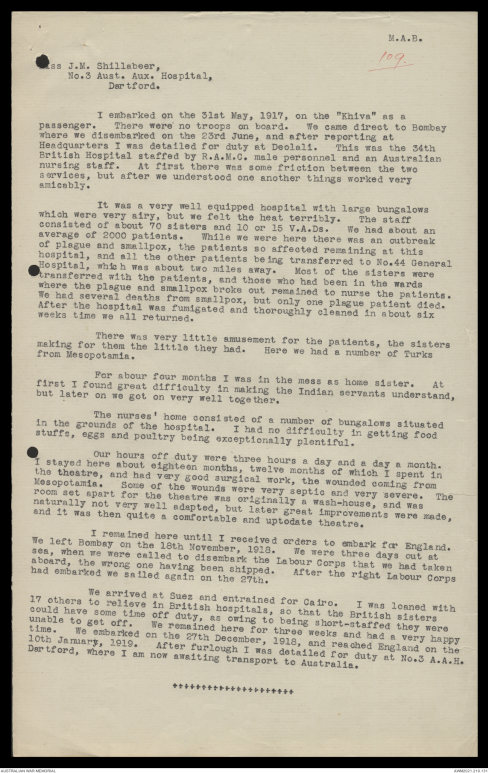
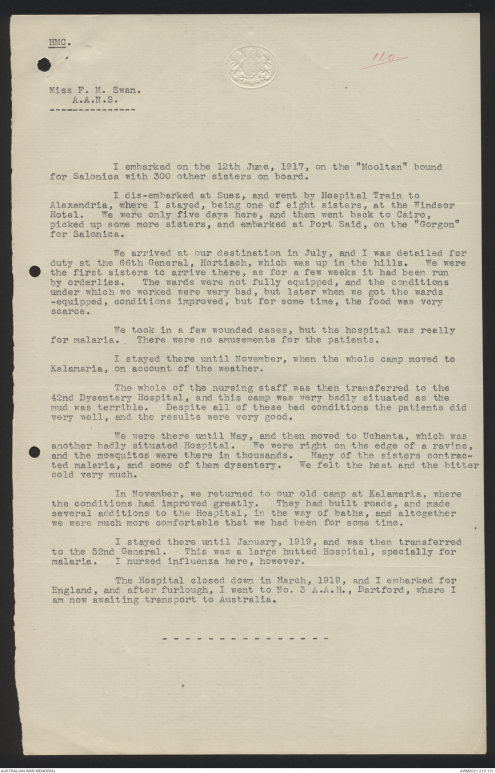
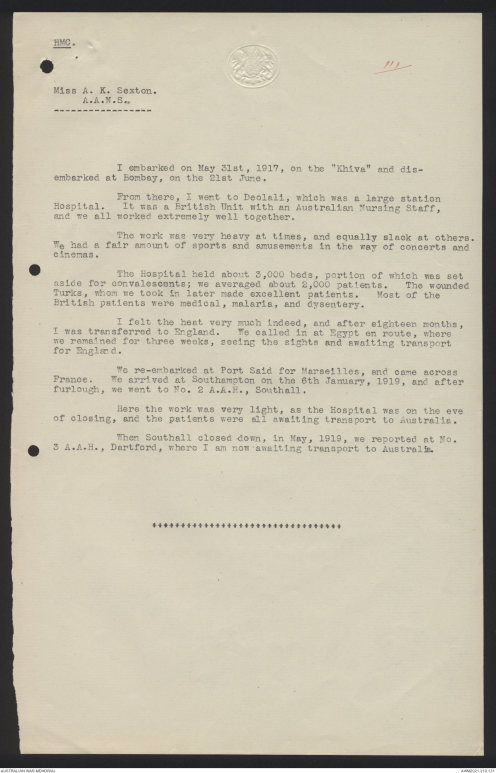
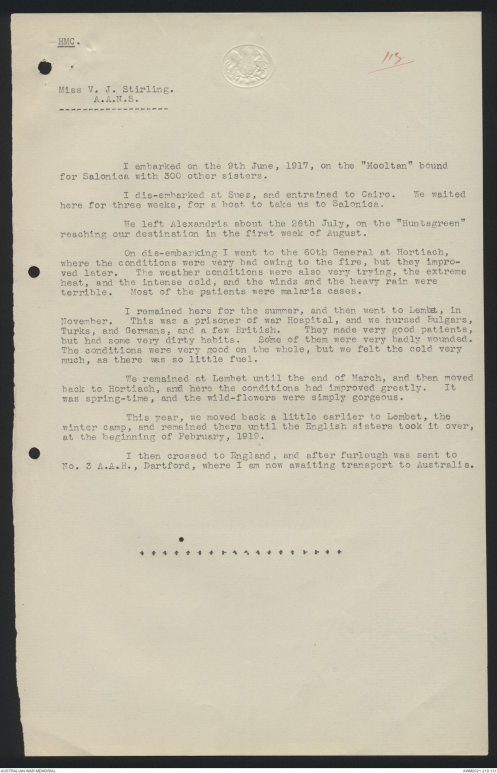
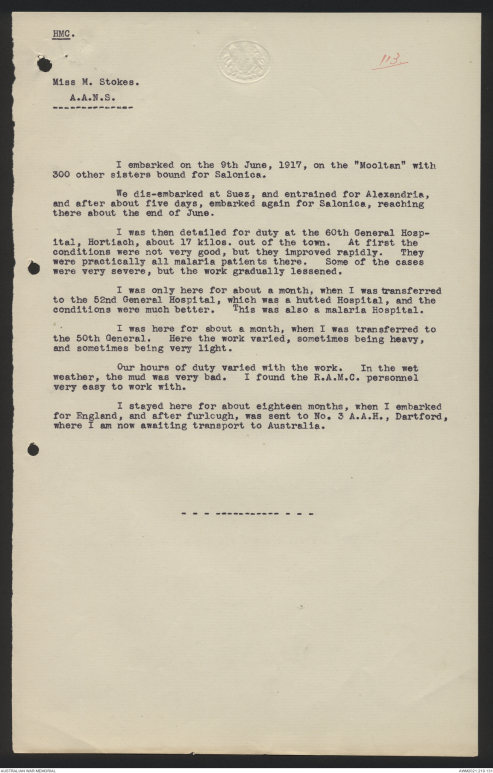
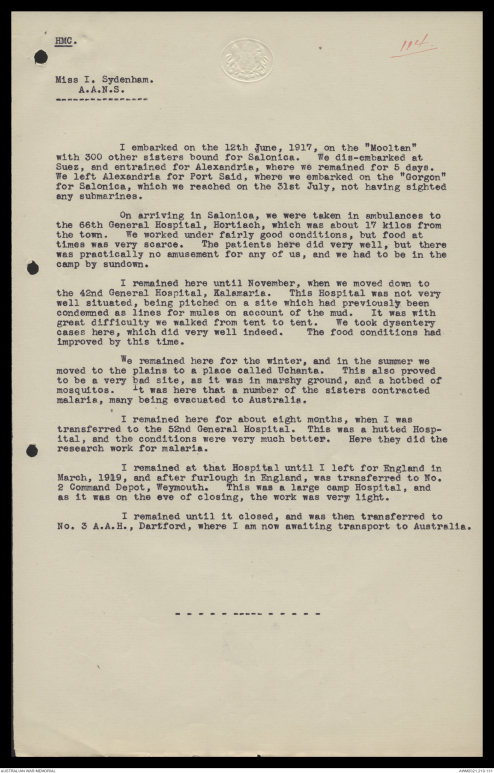
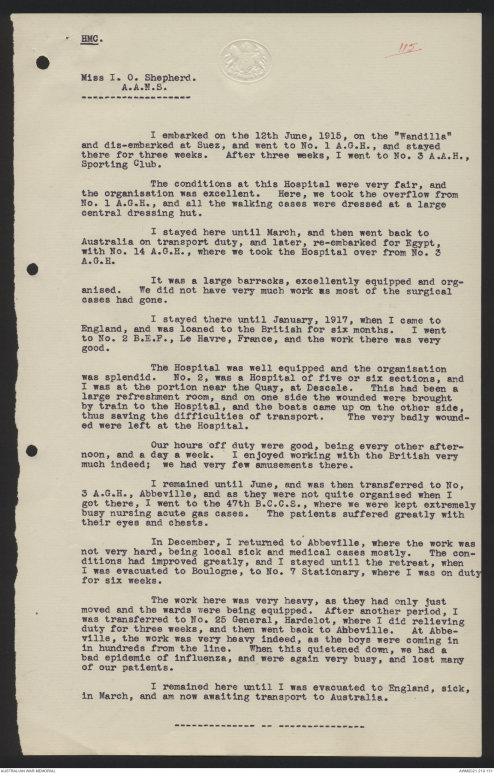
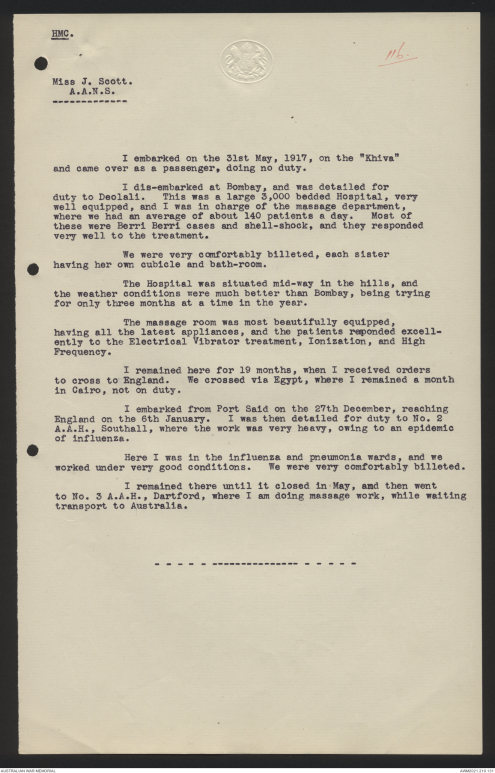
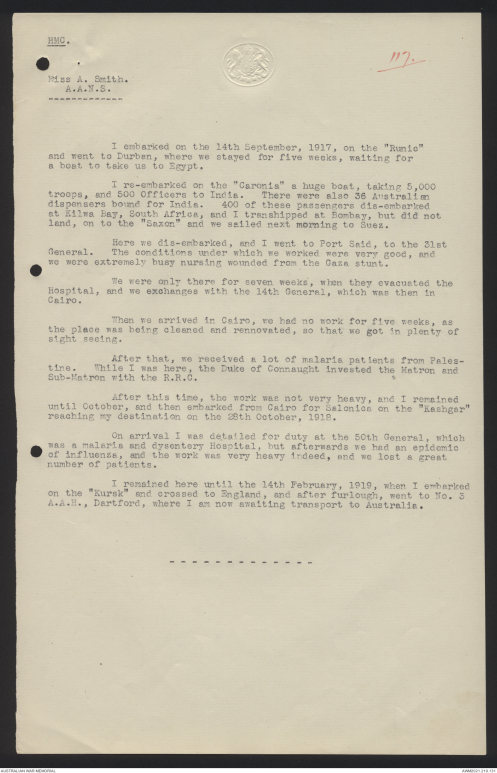
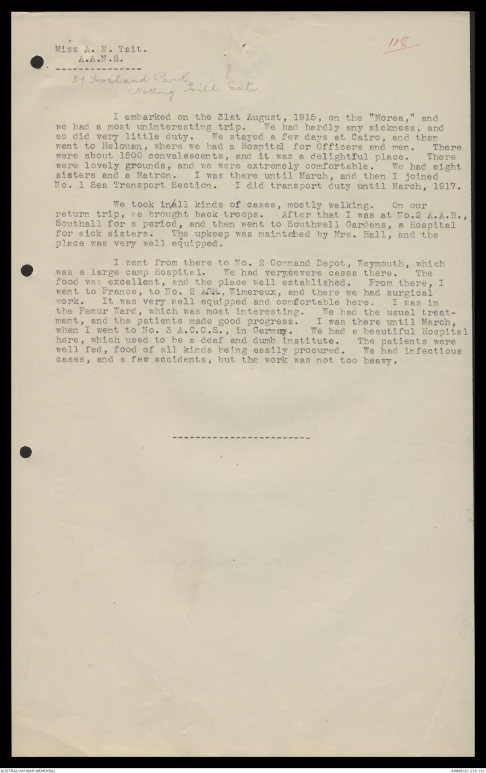
M.A.B.
109.
Miss J.M. Shillabeer,
No. 3 Aust. Aux. Hospital,
Dartford.
I embarked on the 31st May, 1917, on the "Khiva" as a
passenger. There were no troops on board. We came direct to Bombay
where we disembarked on the 23rd June, and after reporting at
Headquarters I was detailed for duty at Deolali. This was the 34th
British Hospital staffed by R.A.M.C. male personnel and an Australian
nursing staff. At first there was some friction between the two
services, but after we understood one another things worked very
amicably.
It was a very well equipped hospital with large bungalows
which were very airy, but we felt the heat terribly. The staff
consisted of about 70 sisters and 10 or 15 V.A.Ds. We had about an
average of 2000 patients. While we were here there was an outbreak
of plague and smallpox, the patients so affected remaining at this
hospital, and all other patients being transferred to No.44 General
Hospital, which was about two miles away. Most of the sisters were
transferred with the patients, and those who had been in the wards
where the plague and smallpox broke out remained to nurse the patients. We had several deaths from smallpox, but only one plague patient died, After the hospital was fumigated and throughly cleaned in about six weeks time we all returned.
There was very little amusement for the patients, the sisters
making for them the little they had. Here we had a number of Turks
from Mesopotamia.
For about four months I was in the mess as home sister. At
first I found great difficulty in making the Indian servants understand,
but later on we got on very well together.
The nurses' home consisted of a number of bungalows situated
in the grounds of the hospital. I had no difficulty in getting food
stuffs, eggs and poultry being exceptionally plentiful.
Our hours off duty were three hours a day and a day a month.
I stayed here about eighteen months, twelve months of which I spent in the theatre, and had very good surgical work, the wounded coming from Mesopotamia. Some of the wounds were very septic and very severe. The room set apart for the theatre was originally a wash-house, and was naturally not very well adapted, but later great improvements were made, and it was then quite a comfortable and up to date theatre.
I remained here until I received orders to embark for England.
We left Bombay on the 18th November, 1918. We were three days out at
sea, when we were called to disembark the Labour Corps that we had taken aboard, the wrong one having been shipped. After the right Labour Corps had embarked we sailed again on the 27th.
We arrived at Suez and entrained for Cairo. I was loaned with
17 others to relieve in British hospitals, so that the British sisters
could have some time off duty, as owing to being short-staffed they were unable to get off. We remained here for three weeks and had a very happy time. We embarked on the 27th December, 1918, and reached England on the 10th January, 1919. After furlough I was detailed for duty at No.3 A.A.H., Dartford, where I am now awaiting transport to Australia.
HMC.
Miss F. M. Swan.
A.A.N.S.
I embarked on the 12th June, 1917, on the "Mooltan" bound
for Salonica with 300 other sisters on board.
I dis-embarked at Suez, and went by Hospital Train to
Alexandria, where I stayed, being one of eight sisters, at the Windsor
Hotel. We were only five days here, and then went back to Cairo,
picked up some more sisters, and embarked at Port Said, on the "Gorgon" for Salonica.
We arrived at our destination in July, and I was detailed for
duty at the 66th General, Hortiach, which was up in the hills. We were
the first sisters to arrive there, as for a few weeks it had been run
by orderlies. The wards were not fully equipped, and the conditions
under which we worked were very bad, but later when we got the wards equipped, conditions improved, but for some time, the food was very scarce.
We took in a few wounded cases, but the hospital was really
for malaria. There were no amusements for the patients.
I stayed there until November, when the whole camp moved to
Kalamaria, on account of the weather.
The whole of the nursing staff was then transferred to the
42nd Dysentery Hospital, and this camp was very badly situated as the
mud was terrible. Despite all of these bad conditions the patients did
very well, and the results were very good.
We were there until May, and then moved to Uchanta, which was
another badly situated Hospital. We were right on the edge of a ravine,
and the mosquitos were there in thousands. Many of the sisters contracted malaria, and some of them dysentery. We felt the heat and the bitter cold very much.
In November, we returned to our old camp at Kalamaria, where
the conditions had improved greatly. They had built roads, and made
several additions to the Hospital, in the way of baths, and altogether
we were much more comfortable that we had been for some time.
I stayed there until January, 1919, and was then transferred
to the 52nd General. This was a large hutted Hospital, specially for
malaria. I nursed influenza here, however.
The Hospital closed down in March, 1919, and I embarked for
England, and after furlough, I went to No. 3 A.A.H., Dartford, where I
am now awaiting transport to Australia.
HMC.
Miss A. K. Sexton.
A.A.N.S.
I embarked on May 31st, 1917, on the "Khiva" and disembarked
at Bombay, on the 21st June.
From there, I went to Deolali, which was a large station
Hospital. It was a British Unit with an Australian Nursing Staff,
and we all worked extremely well together.
The work was very heavy at times, and equally slack at others.
We had a fair amount of sports and amusements in the way of concerts and cinemas.
The Hospital held about 3,000 beds, portion of which was set
aside for convalescents; we averaged about 2,000 patients. The wounded Turks, whom we took in later made excellent patients. Most of the British patients were medical, malaria and dysentery.
I felt the heat very much indeed, and after eighteen months,
I was transferred to England. We called in a Egypt en route, where
we remained for three weeks, seeing the sights and awaiting transport
for England.
We re-embarked at Port Said for Marseilles, and came across
France. We arrived at Southampton on the 6th January, 1919, and after
furlough, we went to No. 2 A.A.H., Southall.
Here the work was very light, as the Hospital was on the eve
of closing, and the patients were all awaiting transport to Australia.
Then Southall closed down, in May, 1919, we reported to No.
3 A.A.H., Dartford, where I am now awaiting transport to Australia.
HMC.
Miss V. J. Stirling.
A.A.N.S.
I embarked on the 9th June, 1917, on the "Mooltan" bound
for Salonica with 300 other sisters.
I dis-embarked at Suez, and entrained to Cairo. We waited
here for three weeks, for a boat to take us to Salonica.
We left Alexandria about the 26th July, on the "Huntsgreen"
reaching our destination in the first week of August.
On dis-embarking I went to the 60th General at Hortiach,
where the conditions were very bad owing to the fire, but they improved later. The weather conditions were also very trying, the extreme heat, and the intense cold, and the winds and the heavy rain were terrible. Most of the patients were malaria cases.
I remained here for the summer, and then went to Lambat, in
November. This was a prisoner of war Hospital, and we nursed Bulgars,
Turks, and Germans, and a few British. They made very good patients,
but had some very dirty habits. Some of them were very badly wounded. The conditions were very good on the whole, but we felt the cold very much, as there was so little fuel.
We remained at Lambat until the end of March, and then moved
back to Hortiach, and here the conditions had improved greatly. It
was spring-time, and the wild-flowers were simply gorgeous.
This year, we moved back a little earlier to Lambat, the
winter camp, and remained there until the English sisters took it over,
at the beginning of February,1919.
I then crossed to England, and after furlough was sent to
No. 3 A.A.H., Dartford, where I am now awaiting transport to Australia.
HMC.
Miss M. Stokes.
A.A.N.S.
I embarked on the 9th June, 1917, on the "Mooltan" with
300 other sisters bound for Salonica.
We dis-embarked at Suez, and entrained for Alexandria,
and after about five days, embarked again for Salonica, reaching
there about the end of June.
I was then detailed for duty at the 60th General Hospital,
Hortiach, about 17 kilos. out of the town. At first the
conditions were not very good, but they improved rapidly. They
were practically all malaria patients there. Some of the cases
were very severe, but the work gradually lessened.
I was only here for about a month, when I was transferred
to the 52nd General Hospital, which was a hutted Hospital, and the
conditions were much better. This was also a malaria Hospital.
I was here for about a month, when I was transferred to
the 50th General. Here the work varied, sometimes being heavy,
and sometimes being very light.
Our hours of duty varied with the work. In the wet
weather, the mud was very bad. I found the R.A.M.C. personnel
very easy to work with.
I stayed here for about eighteen months, when I embarked
for England, and after furlough, was sent to No. 3 A.A.H., Dartford,
where I am now awaiting transport to Australia.
HMC.
Miss I. Sydenham.
A.A.N.S.
I embarked on the 12th June, 1917, on the "Mooltan"
with 300 other sisters bound for Salonica. We dis-embarked at
Suez, and entrained for Alexandria, where we remained for 5days.
We left Alexandria for Port Said, where we embarked on the "Gorgon"
for Salonica, which we reached on the 31st July, not having sighted
any submarines.
On arriving in Salonica, we were taken in ambulances to
the 66th General Hospital, Hortiach, which was about 17 kilos from
the town. We worked under fairly good conditions, but food at
times was very scarce. The patients here did very well, but there
was practically no amusement for any of us, and we had to be in the
camp by sundown.
I remained here until November, when we moved down to
the 42nd General Hospital, Kalamaria. This Hospital was not very
well situated,being pitched on a site which had previously been
condemned as lines for mules on account of the mud. It was with
great difficulty we walked from tent to tent. We took dysentery
cases here, which did very well indeed. The food conditions had
improved by this time.
We remained here for the winter, and inthe summer we
moved to the plains to a place called Uchanta. This also proved
to be a very bad site, as it was in marshy ground, and a hotbed of
mosquitos. It was here that a number of the sisters contracted
malaria, many being evacuated to Australia.
I remained here for about eight months, when I was
transferred to the 52nd General Hospital. This was a hutted Hospital,
and the conditions were very much better. Here they did the
research work for malaria.
I remained at that Hospital until I left for England in
March, 1919, and after furlough inEngland, was transferred to No.
2 Command Depot, Weymouth. This was a large camp Hospital, and
as it was on the eve of closing, the work was very light.
I remained until it closed, and was then transferred to
No. 3 A.A.H., Dartford, where I am now awaiting transport to Australia.
HMC.
Miss I. O. Shepherd.
A.A.N.S.
I embarked on the 12th June, 1915, on the "Wandilla"
and dis-embarked at Suez, and went to No. 1 A.G.H., and stayed
there for three weeks. After three weeks, I went to No. 3 A.A.H.,
Sporting Club.
The conditions at this Hospital were very fair, and
the organisation was excellent. Here, we took the overflow from
No. 1 A.G.H., and all the walking cases were dressed at a large
central dressing hut.
I stayed here until March, and then went back to
Australia on transport duty, and later, re-embarked for Egypt,
with No.14 A.G.H., where we took the Hospital over from No. 3
A.G.H.
It was a large barracks, excellently equipped and organised.
We did not have very much work as most of the surgical
cases had gone.
I stayed there until January, 1917, when I came to
England, and was loaned to the British for six months. I went
to No. 2 B.E.F., Le Havre, France, andthe work there was very
good.
The Hospital was well equipped and the organisation
was splendid. No.2, was a Hospital of five or six sections, and
I was at the portion near the Quay, at Descale. This had been a
large refreshment room, and on one side the wounded were brought
by train to the Hospital, and the boats came up on the other side,
thus saving the difficulties of transport. The very badly wounded
were left at the Hospital.
Our hours off duty were good, being every other afternoon,
and a day a week. I enjoyed working with the British very
much indeed; we had very few amusements there.
I remained until June, and was then transferred to No.
3 A.G.H., Abbeville, and as they were not quite organised when I
got there, I went to the 47th B.C.C.S. , where we were kept extremely
busy nursing acute gas cases. The patients suffered greatly with
their eyes and chests.
In December, I returned to Abbeville, where the work was
not very hard, being local sick and medical cases mostly. The conditions
had improved greatly, and I stayed until the retreat, when
I was evacuated to Boulogne, to No. 7 Stationary, where I was on duty
for six weeks.
The work here was very heavy,as they had only just
moved and the wards were being equipped. After another period, I
was transferred to No. 25 General, Hardelot, where I did relieving
duty for three weeks and then went back to Abbeville. At Abbeville, the work was very heavy indeed, as the boys were coming in
in hundreds from the line. When this quietened down, we had a
bad epidemic of influenza, and were again very busy, and lost many
of our patients.
I remained here until I was evacuated to England, sick,
in March, and am now awaiting transport to Australia.
HMC.
Miss J. Scott.
A.A.N.S.
I embarked on the 31st May, 1917, on the "Khiva"
and came over as a passenger, doing no duty.
I dis-embarked at Bombay, and was detailed for
duty to Deolali. This was a large 3,000 bedded Hospital, very
well equipped,and I was in charge of the massage department,
where we had an average of about 140 patients a day. Most of
these were Berri Berri cases and shell-shock, and they responded
very well to the treatment.
We were very comfortably billeted, each sister
having her own cubicle and bath-room.
The Hospital was situated mid-way in the hills, and
the weather conditions were much betterthan Bombay, being trying
for only three months at a time in the year.
The massage room was most beautifully equipped,
having all the latest appliances, and the patients responded excellently
to the Electrical Vibrator treatment, Ionization, and High
Frequency.
I remained here for 19 months, when I received orders
to cross to England. We crossed via Egypt, where I remained a month
in Cairo, not on duty.
I embarked from Port Said onthe 27th December, reaching
England on the 6th January. I was then detailed for duty to No. 2
A.A.H., Southall, where the work was very heavy, owing to an epidemic
of influenza.
Here I was in the influenza and pneumonia wards, and we
worked under very good conditions. We were very comfortably billeted.
I remained there until it closed in May, and then went
to No. 3 A.A.H., Dartford, where I am doing massage work, while waiting
transport to Australia.
HMC.
Miss A. Smith.
A.A.N.S.
I embarked on the 14th September,1917, on the "Runic"
and went to Durban, where we stayed for five weeks, waiting for
a boat to take us to Egypt.
I re-embarked on the "Caronis" a huge boat, taking 5,000
troops, and 500 Officers to India. There were also 36 Australian
dispensers bound for India. 400 of these passengers dis-embarked
at Kilwa Bay, South Africa, and I transhipped at Bombay, but did not
land, on to the "Saxon" and we sailed next morning to Suez.
Here we dis-embarked, and I went to Port Said, to the 31st
General. The conditions under which we worked were very good, and
we were extremely busy nursing wounded from the Gaza stunt.
We were only there for seven weeks, when they evacuated the
Hospital, and we exchanges with the 14th General, which was then in
Cairo.
Then we arrived in Cairo, we had no work for five weeks, as
the place was being cleaned and rennovated, so that we got in plenty of
sight seeing.
After that, we received a lot of malaria patients from Palestine.
While I was here, the Duke of Connaught invested the Matron and
Sub-Matron with the R.R.C.
After this time, the work was not very heavy, and I remained
until October, and then embarked from Cairo for Salonica on the "Kashgar" reaching my destination on the 28th October, 1918.
On arrival I was detailed for duty at the 50th General, which
was a malaria and dysentery Hospital, but afterwards we had an epidemic of influenza, and the work was very heavy indeed, and we lost a great number of patients.
I remained here until the 14th February, 1919, when I embarked
on the "Kursk" and crossed to England, and after furlough, went to No. 3
A.A.H., Dartford, where I am now awaiting transport to Australia.
Miss A.M. Tait.
A.A.N.S.
37 Holland Park
Notting Hill Gate
I embarked on the 31st August, 1915, on the "Morea", and
we had a most uninteresting trip. We had hardly any sickness, and
so did very little duty. We stayed a few days at Cairo, and then
went to Helouan, where we had a Hospital for Officers and men. There
were about 1500 convalescents, and it was a delightful place. There
were lovely grounds, and we were extremely comfortable. We had eight
sisters and a Matron. I was there until March, and then I joined
No. 1 Sea Transport Section. I did transport duty until March, 1917.
We took in all kinds of cases, mostly walking. On our
return trip, we brought back troops. After that I was at No.2 A.A.H.,
Southall for a period, and then went to Southwell Gardens, a Hospital
for sick sisters. The upkeep was maintained by Mrs. Hall, and the
place was very well equipped.
I went from there to No. 2 Command Depot, Weymouth, which
was a large camp Hospital. We had very severe cases there. The
food was excellent, and the place well established. From there, I
went to France, to No. 2 A.G.H., Wimereux, and there we had surgical
work. It was very well equipped and comfortable here. I was in
the Femur Ward, which was most interesting. We had the usual treatment, and the patients made good progress. I was there until March, when I went to No. 3 A.C.C.S., in Germany. We had a beautiful Hospital here, which used to be a deaf and dumb institute. The patients were well fed, food of all kinds being easily procured. We had infectious cases, and a few accidents, but the work was not too heavy.
 Sam scott
Sam scottThis transcription item is now locked to you for editing. To release the lock either Save your changes or Cancel.
This lock will be automatically released after 60 minutes of inactivity.